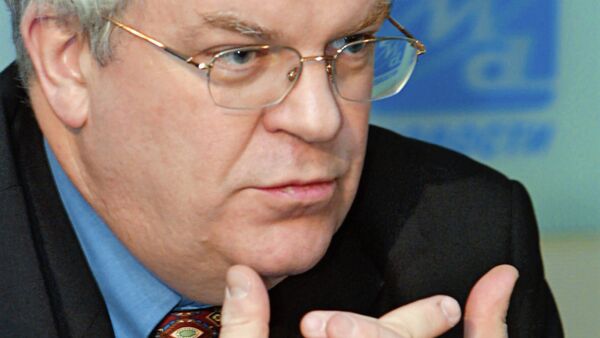BRUSSELS, September 30 (RIA Novosti) – Russia is waiting for proposals from its European partners on a number of issues that raise Moscow's concerns in connection with Ukraine's Association Agreement with the European Union, Russia's Ambassador to the European Union Vladimir Chizhov said Tuesday.
"No agreements have been reached on the date of the next trilateral meeting. Experts continue to work independently, but the ball is in the EU field. They have received a list of our concerns, we are now waiting for their proposals," Chizhov said.
According to Chizhov, "Russia has pointed out five problem areas [related to a free trade zone between the European Union and Ukraine] that require solutions: fees, issues, related to standards and technical regulations, sanitary and veterinary norms, energy and, finally, customs administration."
Chizhov said he expects that work to address the Russian concerns, passed to the European commission on September 12, will start in the near future.
"I think that there is enough time for a compromise to be reached, but the way is not without difficulties," Chizhov noted.
On Monday, the Council of the European Union announced that that the European Union will postpone a free trade zone with Ukraine under the Association Agreement until January 1, 2016.
According to Chizhov, the decision "was expected and is consistent with the agreement, reached in the trilateral format (Russia - Ukraine – European Union) in Brussels on September 12."
The Ukraine–European Union Association Agreement presupposes political and economic association between the two parties. The political provisions of the agreement were signed in March, after the president at that time Viktor Yanukovych was ousted and an interim government came to power. The economic part of the agreement was signed by the current president of Ukraine Petro Poroshenko in June.
Earlier in September, Ukraine and the EU parliaments ratified both parts of the Association Agreement, but postponed the implementation of the EU-Ukraine Deep and Comprehensive Free Trade Agreement until December 31, 2015.
The agreement to delay the treaty's implementation was reached at a trilateral Russia-Ukraine-European Union meeting in Brussels, held after Moscow expressed concerns that the implementation of the treaty carries economic risks for Russia and Ukraine.


